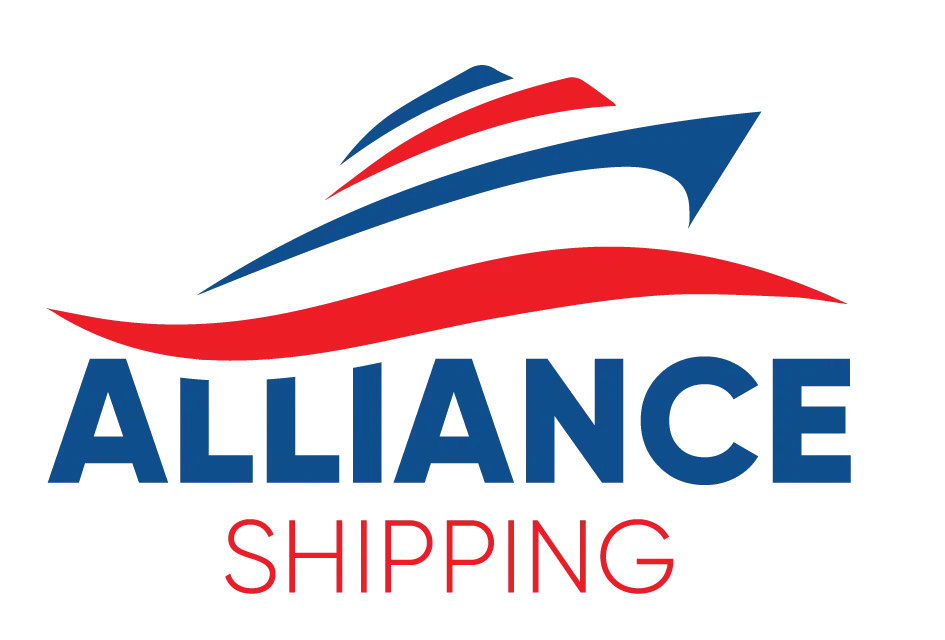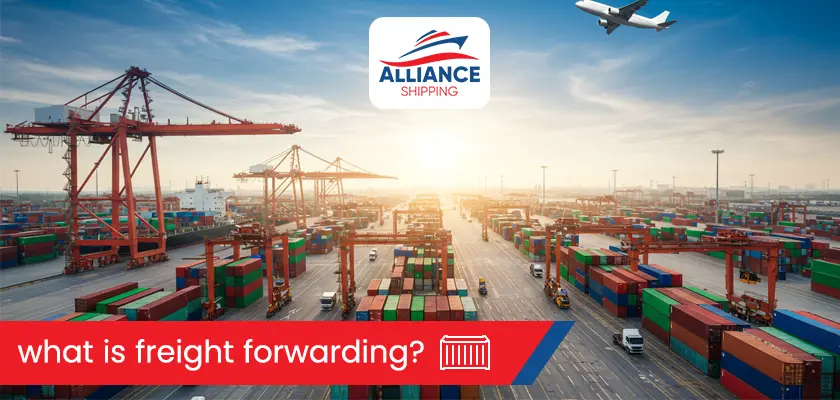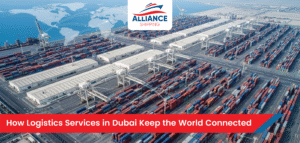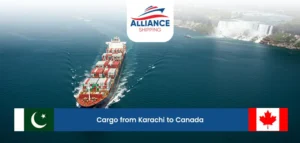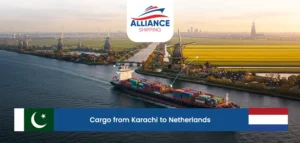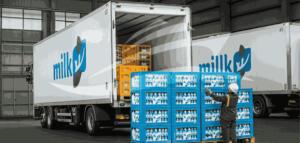A freight forwarder is an individual or a company that specializes in international trade and moves goods across borders for clients. They don’t own the trucks, ships, or planes themselves, but they work with all the companies that do (airlines, shipping lines, trucking companies).
Freight forwarders also perform various shipping tasks, such as booking cargo space, filling out shipping documents, and ensuring the goods pass through customs properly. They are like the travel agents, but for cargo movements, handling every task on your behalf related to your shipments.
This blog provides an overview of freight forwarding and forwarders and how freight forwarders have helped the shipping industry, so keep reading.
What Is Freight Forwarding?
Freight forwarding is the process of organizing and managing how goods are transported from one place to another. It includes every aspect, from choosing the right method of transport to handling paperwork and make sure the shipment arrives on time and in good condition.
The person or the company doing it is referred to as a freight forwarder, often known as the middleman between the client and the shipping carrier. They do all the behind-the-scenes work so that the client doesn’t have to deal with the complexities of shipping. And their goods are transported with ease to their destinations across the world.
Some of the core responsibilities of a freight forwarder or freight forwarding company include the following:
- Building a carrier network: They connect with trusted shipping carriers and negotiate better rates for clients.
- Handling paperwork: They take care of all shipping documents, including the bill of lading.
- Managing customs: They handle or hire experts to manage customs clearance and stay updated on rules.
- Inventory management: They may store goods in a warehouse and track them until delivery.
- Insurance coverage: They often insure goods while they’re responsible for them.
- Freight consolidation: They combine smaller shipments to save costs and reduce emissions.
Let’s understand freight forwarding with a quick example.
Imagine a business in Dubai wants to send handmade rugs to a customer in Russia. A freight forwarder will arrange the best shipping route, possibly sending the rugs from a local warehouse by truck to Dubai port (Jebel Ali), then by sea to a port in Russia, and finally by truck again to the customer.
You, as an individual or a business, don’t have to deal with customs paperwork, freight bookings, or port coordination. Don’t get into the complexities of the shipping. All you wanted was your rugs to reach your location in Russia from Dubai, and these freight forwarders and forwarding companies do it for you.
Types of Freight Forwarding
When you want to ship goods, you have several options, such as rail, land, sea, or air. These are the standard cargo shipping methods, and that’s exactly what freight forwarding companies handle. There aren’t different “types” of freight forwarding; instead, forwarders provide services based on these existing transport modes.
For example, if you want to send cargo from Dubai to GCC countries, you can choose sea, air, rail, or land transport. If you go with land, the freight forwarder will arrange the right type of vehicles, like trucks, trailers, or container carriers, depending on your cargo.
If you choose sea, options like RoRo vessels, bulk carriers, or container ships will be arranged. The same applies to air freight. The forwarder will book the right cargo aircraft based on size, weight, and urgency.
Why Don’t Businesses Just Ship Directly Themselves?
One question that we have heard often is, “Why don’t individuals or businesses just contact a shipping company and get everything done?” It’s a great question, but the answer isn’t as simple as it seems.
Shipping goods, especially from one country to another, isn’t as easy as it might look on the surface. It’s far more complex. One needs to understand how to book cargo space, follow customs rules, manage paperwork, and coordinate with several people involved in the process.
For an average business, handling all of this alone is simply not possible. And for shipping companies, it isn’t feasible either. They can’t spend time answering every single client’s query or guiding them through every step of the process. Doing so would cost them time, manpower, and operational efficiency.
That is why the forwarding concept came, and it’s an old concept. Back in the day, the 18th century, merchants relied on agents to help move their goods safely through different trade routes, countries, and empires. These early freight forwarders handled local rules, taxes, and safe passage, much like modern ones do today.
How Freight Forwarders Made Shipping Easy?
Over the years, freight forwarders and forwarding companies have complemented the shipping industry a lot. They act as problem solvers and coordinators. They bridge the gap between businesses and the complicated world of international logistics.
Most companies don’t have the time, resources, or expertise to deal with port authorities, customs departments, multiple transport modes, and changing regulations in different countries. Freight forwarders take on that responsibility, using their knowledge, contacts, and systems to ensure shipments go with ease.
Once you book your shipment with a freight forwarder, they take full responsibility for the process. That’s why they’ve become such an important part of the modern shipping process. The global shipping industry, which is worth trillions of dollars, heavily depends on freight forwarders and forwarding companies.
How Does Freight Forwarding Work?
Now that we understand the basics of freight forwarding, let’s take a closer look at how it actually works.
Step 1: Agreeing on Trade Terms
The process starts with an agreement. Before anything is shipped, the buyer and seller first agree on who is responsible for each part of the process. These terms are called Incoterms (International Commercial Terms). They help define things like who pays for shipping, who handles insurance, and where the responsibility of goods transfers from seller to buyer.
Step 2: Preparing the Shipment at Origin
Then, based on the agreed terms, the freight forwarder arranges the movement of goods from the supplier’s location to the departure point, such as a seaport or airport. In this stage, inspecting, labeling, and properly packaging the shipment are done.
Step 3: Export Documentation and Clearance
The freight forwarder makes sure all necessary paperwork is completed for the goods to legally leave the exporting country. It includes working with both the supplier and the shipping line or airline to meet local laws and transport requirements.
Step 4: Customs Checks at the Destination
When the shipment reaches the destination country, it cannot proceed until it passes customs inspection again. The freight forwarder prepares and submits all necessary documents in advance, reducing the risk of delays or fines at this stage.
Step 5: Final Delivery to the Destination
Once customs clearance is complete, the freight forwarder arranges the last leg of the journey, delivering the goods to the final location. This could be a warehouse, store, or delivered directly to the customer, depending on the agreed terms. Some freight forwarders even handle storage if needed.
Benefits of Using a Freight Forwarder for Your Logistics
Hiring a freight forwarder can make international shipping much more manageable, especially for businesses that don’t have in-house logistics teams. One of the biggest advantages is expertise. Freight forwarders understand the ins and outs of global trade, from customs rules to shipping laws and transportation options. Their experience helps avoid delays, fines, or costly mistakes that can happen when paperwork or procedures are mishandled.
Another major benefit is access to better shipping rates. Since freight forwarders deal with carriers every day and often ship in bulk, they’re able to negotiate lower prices than most businesses could get on their own.
Also, they simplify the customs clearance process for your goods, which can be one of the most confusing parts of international shipping. They handle the paperwork, reducing the chances of your shipment getting stuck at a border.
Freight forwarding companies help manage shipments that involve out-of-scope goods items that require special handling, licenses, or compliance (like chemicals, machinery, or restricted items). A freight forwarder knows how to process these goods properly, making sure they meet all legal and safety requirements. Other advantages include reliable tracking, reduced risk, and end-to-end support.
Risks Associated with Freight Forwarders
While freight forwarding makes shipping easier, there are still some risks involved (especially if you’re working with the wrong partner). Delays are one of the most common issues, which can happen due to customs problems, port congestion, bad weather, or incomplete paperwork.
Another concern is miscommunication. If the forwarder doesn’t clearly understand your requirements or if important information gets lost between parties, it can lead to shipping the wrong items, incorrect documentation, or delivery to the wrong location. There’s also the risk of cargo damage or loss, especially if proper packaging and insurance are not in place.
